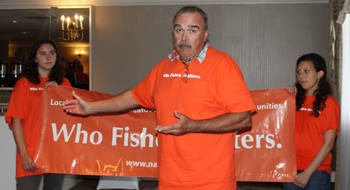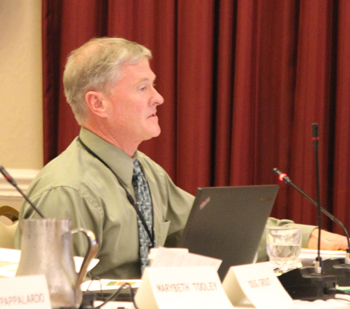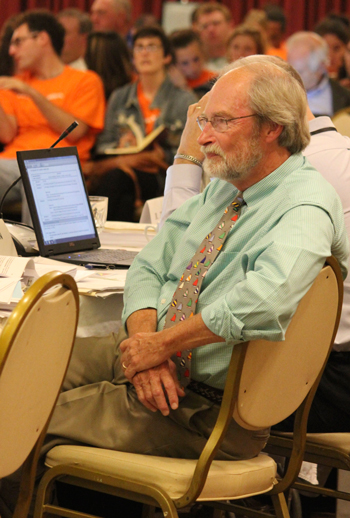Council Listens But Does Not Hear

Sandwich, Massachusetts fisherman Bill Chaprales in support of “Who Fishes Matters” at the NEFMC meeting in Plymouth, MA. Chaprales, a small vessel fisherman, has been active in management issues, collaborative fisheries research and had commercially hand-lined cod for years. He said he has seen the historically productive smaller boat fishery in his area decimated by catch shares. Chaprales said the rejection by NMFS scientists of large volumes of fishermen’s stock data, which contradicts the fisheries scientist’s stock assessments, is more about federally funded science turf and job security than sound fisheries science. Fishermen’s Voice photo
In the run-up to the final vote on Groundfish Amendment 18, the council heard comment that has been at the heart of fishermen’s criticism of the council process for many years with regard to fleet consolidation resulting from quota cuts and catch share programs.
David Pierce, Director of the Massachusetts DMF and council member, said he was concerned about the lack of traction fishermen’s observations of stocks in the water get within the science and council process. He said it was hard for him to reconcile what fishermen report seeing and the facts and figures they have to support it. “I’m still struggling to reconcile so much of what’s been said lately by fishermen who report seeing large numbers of cod and flounder, saying they are everywhere in the Gulf of Maine.”
Pierce asked Paul Rago, a scientist with the National Marine Fisheries Service, how the science center responded to information from fishermen’s observations gathered at outreach meetings NMFS held in August. “Was it used or followed up on with fishermen to carry on this conversation?” asked Pierce. Rago said, “Fishermen’s observations are real.” But, he said, the process fisheries scientists use did not allow for the use of this information.

Frank Blount, NEFMC member. Blount, a Rhode Island fisherman, argued the logbook data fishermen keep show far larger stock figures than official stock assessment data. Fishermen’s Voice photo
Rago’s comment was viewed by Cape Cod fisherman Bill Chaprales as part of the problem rather than an answer to Pierce’s question. “The only way to solve this disconnect between scientists and fishermen’s knowledge is to put scientists on fishing boats with fishermen and let them see for themselves what is going on,” said Chaprales.
Chaprales was a member of a group who testified in public hearings in which fishermen called for an end to what they said was the destruction of the inshore fishery by large vessels coming inshore and pulse fishing areas until they were emptied of fish. That testimony led to the development of Amendment 18. The Amendment that came out of that included an inshore and offshore fishery; trip limits of 800 lbs.; and a line that ran from Plymouth, MA across the Gulf of Maine and Georges Bank to the 200 mile EEZ. “That and more was all cut out of Amendment 18 by the big boat owners and interested parties by the time it was voted in on September 30th,” said Chaprales.

David Pierce, Director, Massachusetts DMF & NEFMC member. Pierce prior to voting on Amendment 18 said to the council, “Despite my reservations. Despite my serious disagreement with some of the choices we have made, I am very reluctantly going to vote for this Amendment (18). Fishermen’s Voice photo
Council member Frank Blount said in the morning session that large numbers of 20 lb., 30 lb. and 40 lb. Georges Bank cod are being caught off Montauk, Long Island, NY and off the New Jersey shore.
Blount described the number of cod in that area as “phenomenal.” He reported catching 9,427 fish in Rhode Island waters last year, while Rhode Island’s state landings data recorded 800 fish caught in total. What makes these comments important, fishermen have said, is that they comport with what fishermen have been saying for a long time and with the fishermen’s reasoning that the fish can come back and in many cases are back, while the decisions of the council are driving fishermen out of the business because council science trumps actual observation.
Several on the council expressed concern that the amendment was flawed and not ready for passage after spending four years before the council.
Former council chairman John Pappalardo said he thought the council was doing things on the fly.
